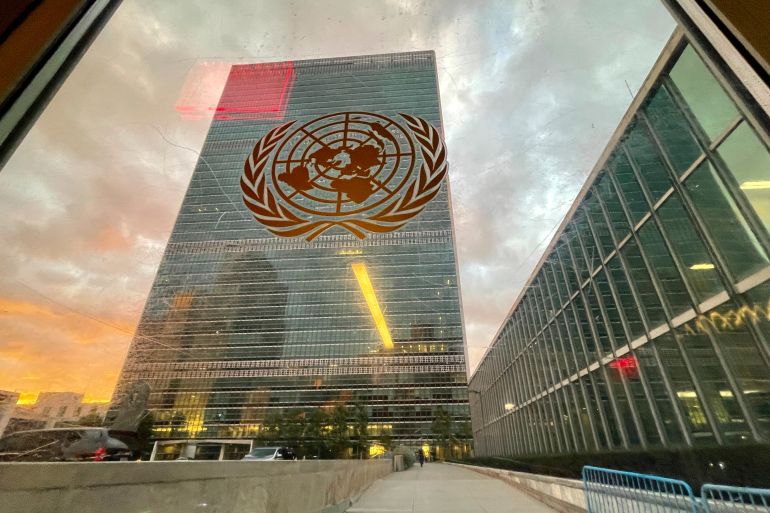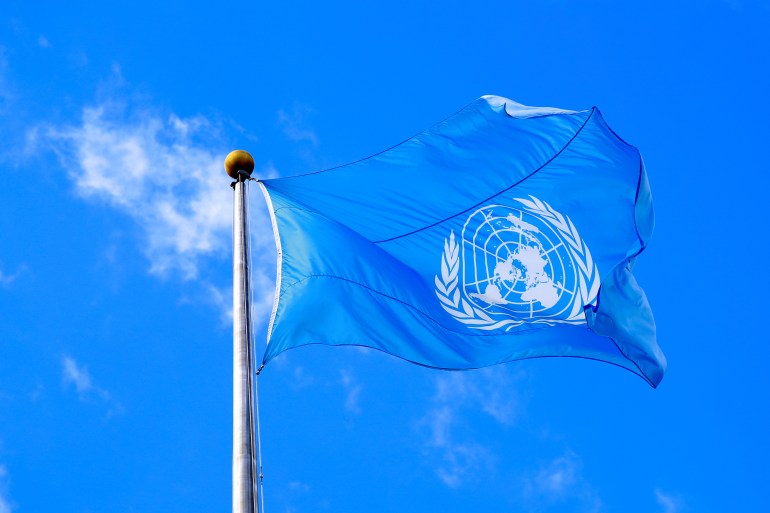Who will speak for Afghanistan at the United Nations?
The Taliban want to represent Afghanistan at the UN, but so does the current accredited ambassador appointed by former President Ashraf Ghani.

United Nations Secretary-General Antonio Guterres received a letter on Monday from the “Islamic Emirate of Afghanistan” – which the Taliban declared last month – signed by Amir Khan Muttaqi, who goes by the title “Minister of Foreign Affairs”.
The letter included a formal request by the Taliban to participate in this year’s UN General Assembly (UNGA) and to inform the world body that it had nominated Suhail Shaheen, its Doha-based spokesman, as its new ambassador to the UN.
Keep reading
list of 4 itemsUS blocks Palestinian push for full UN membership at Security Council
Why is Germany maintaining economic ties with China?
UN’s Libya envoy resigns citing no hope for political progress
But the Taliban was not the only one vying to represent Afghanistan at the annual gathering of member states.
A few days earlier, Guterres had received a communication from Afghanistan’s current accredited Afghan ambassador to the UN, Ghulam Isaczai, according to UN spokesman Stephane Dujarric.
Isaczai no longer represents Afghanistan, Muttaqi argued in his letter, because former Afghan President Ashraf Ghani was “ousted” as of August 15.
The question of who speaks for Afghanistan has now landed in the lap of the UN General Assembly’s nine-member credentialing committee that includes the United States, Russia and China.
The committee is tasked with assessing the claim, making a recommendation and sending it back to the General Assembly, which will debate and then accept or reject it.
As a body, the UN doesn’t formally recognise governments. Instead, it recognises the official representatives of its member states. The committee isn’t expected to meet before the close of the UNGA – so a Taliban representative is unlikely to speak this year. And while Isaczai remains in the seat for now, it is unclear whether some countries will object to him speaking next week.
Rival claims
The governments that comprise the 193 UN member states span from monarchies to dictatorships to democracies. And none of them is above the process for determining who legitimately represents member states.
If the UN General Assembly does accept Shaheen’s credentials, then the Taliban will be formally represented there.
But that does not equate to international recognition. And there’s a history of rival governments having their UN representation bids rejected.

China, a founding member of the United Nations, was denied UN representation after the 1949 Communist revolution. The defeated Nationalist government in Taiwan retained China’s seat until 1971, when the General Assembly voted to expel Taiwan and recognise the Communist government in Beijing.
In 1997, there were two rivals for Cambodia’s seat, but the committee decided to neither accept nor reject the credentials that had been submitted. Cambodia’s seat remained vacant – the only time in the UN’s history that has happened.
A poor human rights record can also land a government afoul of UN gatekeepers.
South Africa was suspended by the General Assembly in 1974 and its UN representation wasn’t fully restored until 20 years later, when apartheid was abolished.
And the UN refused to recognise the Taliban government the last time the group was in charge of Afghanistan from 1996 to 2001. Instead, the UN gave the seat to the government-in-exile, at the time headed by President Burhanuddin Rabbani, who was assassinated in Kabul in 2011.
Human rights hurdles and humanitarian crisis
Since seizing control of Afghanistan last month, the Taliban has tried to project a reformed image by promising to show respect for human rights, including the rights of women and girls.
But the Taliban has not changed its ways, say rights groups. On Tuesday, Amnesty International, the International Federation for Human Rights and the World Organisation Against Torture accused the group of “steadily dismantling” human rights gains of the past 20 years.
“In just over five weeks since assuming control of Afghanistan, the Taliban have clearly demonstrated that they are not serious about protecting or respecting human rights,” said Dinushika Dissanayake, Amnesty International’s deputy director for South Asia, in a statement. “We have already seen a wave of violations, from reprisal attacks and restrictions on women, to crackdowns on protests, the media and civil society.”
But a spiralling crisis marked by deepening hunger, poverty, and a near collapse of Afghanistan’s healthcare system is compelling the UN to engage with the country.
Last week, Guterres warned during a high-level ministerial aid conference that the country – which has seen billions of dollars in western and other international aid dry up in the wake of the Taliban takeover – is facing a looming “humanitarian catastrophe”.
“I urge all member states to dig deep for the people of Afghanistan in their darkest hour of need,” said the secretary-general.
Richard Gowan, UN director at the non-profit International Crisis Group, told Al Jazeera he is surprised that the Taliban made a bid for Afghanistan’s UN seat this week when they already have the ear and the help of top UN officials.
“It’s just impossible to say whether this is some knee-jerk thing or it’s more calculated based on an actual reading of what can get past the credentialing committee,” said Gowan.
The Taliban “will be on the receiving end of a huge amount of criticism on women’s rights, especially with Europe telling them they have to live up to international norms,” he added.
Candace Rondeaux, the director of Future Frontlines at New America, told Al Jazeera that the timing of the Taliban’s UN seat gambit reveals varying degrees of the group’s diplomatic savvy.
“There are portions of the Taliban leadership that clearly have a stronger grasp on Afghanistan’s position in the world,” she said.